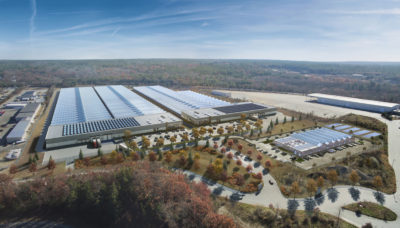
AmeriCann, Inc. may soon establish one of the largest cannabis cultivation and processing facilities in the nation within 50 miles of Boston, bringing with them their innovative line of marijuana products that are healthier alternatives to smoking — marijuana-infused balms, lotions and health drinks.
The Denver-based company works to produce sustainable medical cannabis and has secured approximately $10 million in equity financing to construct their proposed one million square foot facility on a 52-acre plot of land in Freetown, Massachusetts, according to an AmeriCann, Inc. press release.
This is the first phase of the new Massachusetts Medical Cannabis Center and will cater to patients who use marijuana for medicinal purposes, according to the release.
The company may also benefit from the implementation of the adult-use cannabis program in the state, which is currently having regulations set by the Cannabis Control Commission, The Daily Free Press reported.
“Massachusetts is one of the most dynamic developing cannabis markets in the United States,” AmeriCann CEO Tim Keogh said in the release. “Our MMCC project will become a center of excellence for quality, consistency and efficiency and play an important role in helping to provide the cannabis interstate the commonwealth requires.”
Kamani Jefferson, president of the Massachusetts Recreational Consumer Council, said the cannabis center possesses the ability to increase the quality of marijuana products in the area.
“There should be more product, legal product, in Massachusetts and the Boston area,” Jefferson said. “That should affect quality control in terms of more high quality products, whether it’s a flower, concentrated or edible. I think the quality of the buy should go up, so the demand could potentially increase.”
In light of varying officials’ pushback on marijuana use, Kamani expressed AmeriCann, Inc. may experience some difficulties through the construction process.
“Their plans may be foiled because of more moratoriums, bans and even zoning,” Jefferson said. “The recreational [marijuana] could be different zoning than medical [marijuana]. [AmeriCann, Inc.] really needs to be paying attention to what’s going on at the state level, and potentially if Freetown is even talking about a recreational moratorium that could slow down their business market.”
Jim Borghesani, former spokesperson for the Yes on 4 campaign, said AmeriCann, Inc. is well positioned to meet the demands of consumers, as well as aid commerce if need be.
“AmeriCann is going to be a great help in making sure that the stores that will eventually open will have enough inventory to meet consumer needs,” Borghesani said. “They’ll also … be ready to help commerce if product is ever allowed to be sold across state lines. Right now it’s not.”
Based on his prior knowledge of the company, Borghesani said he does not believe AmeriCann, Inc. will have any issues dealing with the local government.
Bill Downing, member liaison for the Massachusetts Cannabis Reform Coalition, wrote in an email that a large corporate influence on the cannabis industry in Massachusetts may serve as catalyst to further progress and expansion within the new market.
“Knowing big corporate money is inevitably going into cannabis, seeing money come to Massachusetts is not a threat, but a local economic benefit,” Downing wrote. “Where it is in the interests of bureaucracies to make processes slow, painful, expensive … it is in the interests of business to move quickly.”
Downing wrote the more entrenched the cannabis industry becomes in Massachusetts over a short period of time, the more difficult it will become for government officials like U.S. Attorney General Jeff Sessions to attempt to shut it down.
Several Boston residents praised the coming arrival of the cannabis cultivation and processing facility for the benefits it may bring to the state economy, and for the product being more accessible to those who use marijuana for health related reasons.
Michael Williams, 26, of Back Bay said he supports the construction of the MMCC because marijuana is useful for those who require the substance for medicinal purposes, and voiced that the center’s influence may aid the local economy.
“It does good for people who are in need for it,” Williams said. “It will help the market. Maybe it will go to schools, and certain areas that need more money. I’m sure our governor and our mayor doesn’t like it, but I think it will be good for the people of Boston and Massachusetts.”
Caroline Rubin, 23, of Back Bay said in consideration of Boston’s heavy student demographic and local voters’ move to pass marijuana legalization legislation, the facility will likely do well in the state.
“I know that since Boston is a pretty liberal place with a lot of students, I’m sure it will be well received,” Rubin said. “I think the center being built will help to open up [the cannabis] market.”
Taylor DiJohnson, 25, of Back Bay said she is in favor of the MMCC being built in the state, and added it may serve as a way to educate the public on the positive effects of marijuana.
“It’s definitely better than alcohol,” DiJohnson said. “It does help more than it does harm. I’m sure the government and center will clash a little, but I think it will be very educational for the general population.”






















































































































